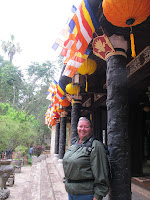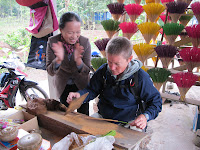Because Hue was once the capital of Vietnam, the countryside surrounding the town contained numerous Emperor's burial tombs. Phyllis had done all of the research and knew which ones were the closest and which ones were worth seeing. We left the hotel and were immediately accosted by a motorcycle driver. After negotiating a price of $10.00/each for the day, he called a friend and we set off in a light drizzle.
Our first stop was the Tu Hieu Monastery where a few dozen monks still live and work. The spiritual head of the monastery is Thich Nhat Hahn, a world renowned author who had been living in exile in France since the communists won the war, and had only recently returned. The monastery was set on a relatively small hill, in a quiet pine forest.
G- OMG! Look at the baby monkey. (He walked on a leash beside a young monk.)
P- How cute is he?!
G- Adorable! I want to pet him.
We approached the young monk who gave us permission to pet his monkey, but before the permission was granted, the little monkey stopped yanking on the monk's robe and was trying to climb up Phyl's leg. She petted his head and he grabbed hold of her arm and hand. Just like a baby, of any kind, he began trying to teeth on her hand. After a few minutes, I had my turn to play with him.
G- He is so cute. I really want to hold him.
P- I don't think our permission extends quite that far.
G- I know. Isn't it nice to finally get to pet a monkey and not be afraid that it might attack us?
I'm surprised you touched him as quickly as you did considering how much you've carried on about monkey bites since we arrived in Asia.
P- This one seems tame and you may have noticed, he did not come racing towards me like he was coming to steal my jewelry.
Back on the motorcycles, we headed to the tomb of Emperor Tu Duc, stopping on the way, at a village sales stall where a lady was making scented incense sticks.
My driver – Do you want to try rolling the incense stick?
G- Yes!
P- My lil goofy girl! You are always willing to volunteer for whatever.
G- Why not? Now I'll know how to make incense sticks should the need ever arise.
P- I think there's a big need for that.
G- Hell, in Buddhist countries they burn these things like crazy. Maybe I'll become an incense manufacturer when we return home.
P- News flash, I don't think you can make a living selling incense sticks to the few Buddhists in the US.
G- Whatever. Knowledge is power.
P- You are a fool.
G- A fool who now knows how to make incense sticks! Ha!
Of course we had to buy some sticks and 2 paintings, after all, isn't that why the motorcycle drivers brought us here? The area was also known for the making of conical hats and another lady sat making one nearby. If you held them up to a light, you could see images through the palm due to the paper doll like cut outs that were glued to the inside of the hat.
P- I really want a hat.
G- I'd say get one, but how in the hell would you get it home? It would get totally smashed.
P- I know, but I want one! Whah.
G- No whining, Gladys. I bet you could buy one out in Village d' lest when we get home.
P- But I want one from Vietnam.
G- It's almost the same if you buy one in Village d'lest. Watch how she's making it and you can make your own.
P- Yeah, right. I cook. I don't do crafts.
G- Then no hat for you.
We arrived at Tu Duc's tomb complex before lunch and were directed by our drivers, to return to a certain 'restaurant' for lunch, where they would be waiting. The tomb complex was incredibly large, was set in a pine forest, included a lake, and had actually been Tu Duc's summer home. We strolled around the gardens, toured a pleasure pavilion, then climbed to his Stele. A Stele is a stone slab, upon which was etched the story of the emperor's life and reign. This one had his story etched in bronze. It is usually written by the emperor's son, after his death, but Tu Duc had no offspring (not due to a lack of trying, as he had myriad wives and concubines, but it is believed that he was sterile from small pox) and had written his himself. Most striking about the buildings and tomb was the Chinese writing and architecture. We later learned that the Chinese had most heavily influenced this area, before the French invaded.
P- Where do you want to eat lunch?
G- I guess we'll eat where the drivers want us to eat. You know they're getting a free lunch or something for bringing us there.
P- We don't have to eat where they tell us to eat.
G- I know we don't, but the food is probably the same at all of these places, so we might as well help them out.
P- You're probably right. I'm sure we can choose from rice, rice or rice, no matter where we eat.
As we were finishing lunch a cycling group of Europeans pulled up and stopped for lunch.
G- How'd you like to be cycling around Vietnam?
P- No, thank you. That's something crazy Michelle & Laurence would like, but not me.
G- Yeah, every Saturday they ride further than these cycling 'vacationers' do each day. I'm sure it'd be a piece of cake for them.
P- I'd rather just have the cake.
It was misting as we drove to and along the river, then headed onto a narrow, dirt path to the tomb of Minh Mang. This tomb was really secluded, in the countryside, and we basically walked around the grounds by ourselves. We first walked through the outer wall, across a small bridge over the Crescent Lake, then into the Honors Courtyard, which resembled the one in Tu Duc's tomb, but seemed larger. To get to the Stele we had to climb a lot of steps, but the view was rewarding.
G- What a peaceful setting. It's good to be the king.
P- Of course, you don't get this setting until you're dead.
G- At least when you're dead you don't have to climb all of these steps; other people carry your body.
P- I might be dead by the time we finish climbing all of these steps today.
G- Well I'm not carrying your dead body, so make sure you collapse at the bottom.
P- I love that you love me.
G- I'm practical. Why hurt my back if you're already dead? It would only be worth it to hurt my back if there was a chance of saving you.
We walked down the stairs, across a courtyard, then up more stairs to another gate which led to the tomb. We walked through a neatly manicured planter garden, then onto another bridge spanning the lake. A woman sat nearby hawking souvenirs and selling hot tea. Fortunately, as we headed out, we were able to walk along the lake and around all of the stairs. We reunited with our drivers at an older lady's wooden structure, where we were instructed to sit in small plastic chairs and served hot tea. There was just no getting around drinking the hot tea. Chicks scratched at our feet as we drank our tea.
Our final stop was the Tomb of Emperor Khai Dinh. Built in the early 1900's, on Chau Chu Mountain, in a Vietnamese style, with obvious and abundant French elements, this is the smallest of the tombs. We climbed many steps to reach the first level consisting of the Honors Courtyard and Stele Monument. Up additional steps, we reached the tomb itself, made of white, heavily carved, stone. Whereas the outside was plain white, the glass and ceramic mosaics on the inside contained every color on the color wheel, and the ceiling was painted in vibrant colors.
On our way back to Hue we stopped at a bunker, built during the “American” war, at a curve in the Perfume River. The vantage point was incredible and we could see for miles in each direction. The bunker was relatively small, and dark, and Phyl refused to even go near the door, her claustrophobia rising to the surface.
We returned to Hue around 5:00 pm and I handed each of the drivers 225,000 Dong ($10.00/each, as agreed, plus an approximate 10% tip). Generally, tipping is not done, nor is it expected, in Vietnam, and we tipped very few people while we were there, but we enjoyed our tour and our driver/guides did a good job. Well, as usual, no good deed goes unpunished.
Gina's driver – This all you pay?
G- We agreed on $10.00.
Gina's driver – You give 1,000 Dong tip?
G- $10.00 equals 200,000 Dong. The tip is 25,000 Dong.
Gina's driver – No. 22,000 Dong is 1 dollar.
G- We have paid everyone 20,000 Dong to the dollar and we only get 19,000 Dong to the dollar.
P- You see, that's what you get for giving a tip in the first place. I told you we didn't have to tip them.
Take back the 25,000.
Phyl's driver (who spoke good English) – (to us) Everything ok. (to Gina's driver he said something in Vietnamese.)
G- (to Phyl's driver) We agreed on $10.00 which equals 200,000 Dong.
Phyl's driver – Yes. Everything is ok.
Gina's driver – Continued to complain in Vietnamese.
P- Take the 25,000 back! Ungrateful bastard.
G- (to Phyl) Your driver isn't being an asshole! I'm not taking back his tip.
(to Phyl's driver) What is his problem? I'm sure I don't even want to know what he's saying. Tell him he doesn't get to inflate the exchange rate and it's not as though most of my payment goes to a 3rd party and he's only getting a little bit of it. He negotiated the charge and if he doesn't like my tip, he can give it back.
Phyl's driver – (trying his hardest to soothe everyone) It's ok. Thank you. (He pulled my driver away, still complaining, as we walked off.)
We were incensed and shocked by what had happened. Part of it was our fault for having negotiated in US Dollars and not in Dong, but we could not understand why he expected a big tip. The incident bothered me for the remainder of the evening and I continued to process it. This annoyed Phyl who has the ability to just say screw it and screw him and not give it another thought. Too bad! While I'm processing, she has to listen.
We had had enough of Hue and the intensity of the hawkers and made arrangements with the hotel desk clerk to take the train to Hanoi. Our preference is to ride the train during the day so that we can see the beautiful countryside, but we learned that the only train to Hanoi left at 5:00 pm and would arrive in Hanoi at 6:00 am the next morning. As we booked our tickets, we chatted with 2 girls from Norway, Maddie & Vera, who were taking the train with us.












